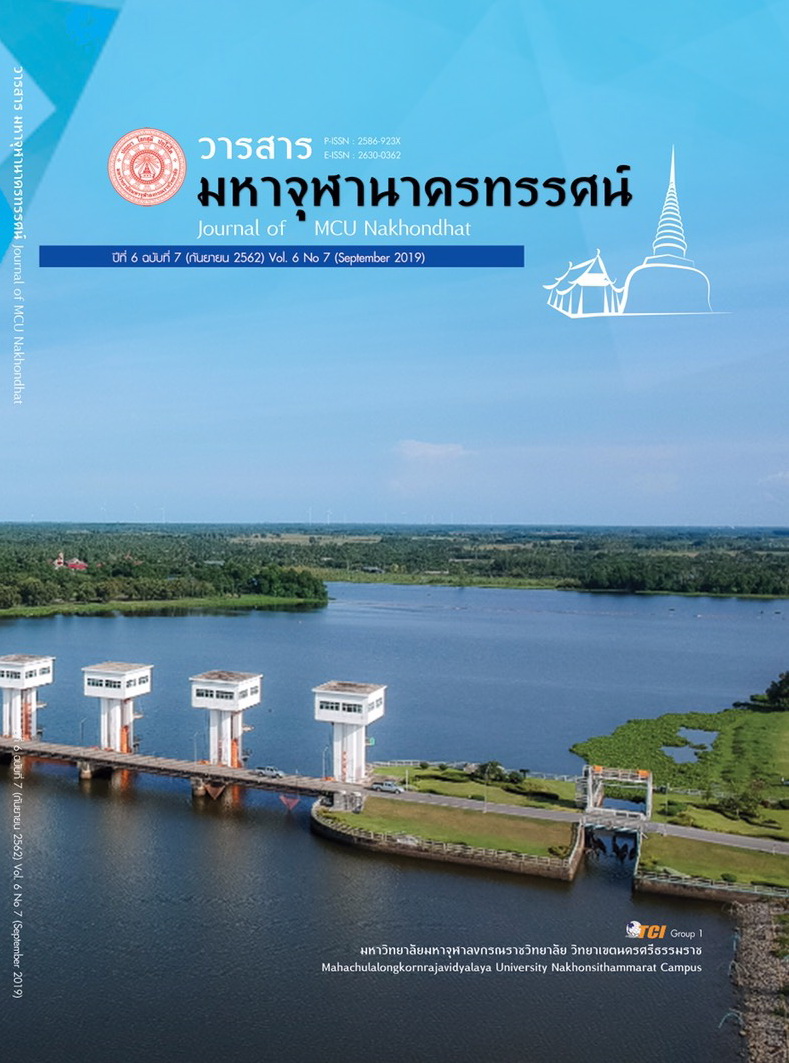A DEVELOPMENT OF HOLISTIC WELL-BEING FOR THE ELDERLY BASED ON BUDDHIST PSYCHOLOGY
Main Article Content
Abstract
The study aims 1) to study Buddhadhamma and Psychological principles for developing the holistic well-being for the elderly based on Buddhist Psychology; 2) to construct the development program of the holistic well-being for the elderly based on Buddhist Psychology; and 3) to propose the development program of the holistic well-being for the elderly based on Buddhist Psychology. The study is a mixed methods research between a qualitative method and survey research. Qualitative data were collected using In-depth interview from 17 key informants. Quantitative data were collected using questionnaire from 322 respondents who are the elderly from Chao Phaya group of Bangkok selected by a Random Sampling Method. Data were analyzed using frequency, percentage, mean and standard deviation and content analysis, results of which found that there were 5 elements of the holistic well-being suitable for the elderly including a physical well-being, social well-being, emotional well-being, mental well-being and intellectual well-being, 6 dimensions of Ryff and Keyes’s mental well-being development including self-being, environmental management, self-growth, good relationship, life target and recognition, while the Buddhadhamma promoting the mental well-being comprised 7 Suitable things and Threefold Training favorable to holistic well-being and the result after the training was significantly higher than before training at .05.
Article Details
References
คณะกรรมการผู้สูงอายุแห่งชาติ กระทรวงการพัฒนาสังคมและความมั่นคงของมนุษย์. (2553). แผนพัฒนาผู้สูงอายุแห่งชาติ. กรุงเทพมหานคร: เทพเพ็ญวานิสย์.
ทิพย์วดี เหลืองกระจ่าง. (2550). การพัฒนารูปแบบการเรียนรู้ตามแนวพุทธศาสตร์เพื่อพัฒนาผู้สูงอายุ. ใน วิทยานิพนธ์ครุศาสตรดุษฎีบัณฑิต สาขาวิชาพัฒนการสอน. จุฬาลงกรณ์มหาวิทยาลัย.
ทิพวรรณ สุธานนท์. (2556). การประยุกต์ใช้หลักธรรมในการดำเนินชีวิตอย่างมีความสุขของผู้สูงอายุ. ใน วิทยานิพนธ์ สาขวิชาาพระพุทธศาสนา. มหาวิทยาลัยมหาจุฬาลงกรณราชวิทยาลัย.
พีสสลัล ธำรงศ์วรกุล. (2559). การพัฒนาโปรแกรมการให้การปรึกษาครบครัวเชิงบูรณาการเพื่อสร้างเสริมสุขภาพจิตผู้สูงอายุ. ใน ดุษฎีนิพนธ์ศึกษาศาสตรดุษฎีบัณฑิต สาขาวิชาจิตวิทยา. มหาวิทยาลัยรามคำแหง.
สุวิจักขณ์ ภานุสรณ์ฐากูร. (2559). กระบวนการพัฒนาจิตเพื่อเสริมสร้างสุขภาวะองค์รวมตามแนวพุทธจิตวิทยาและการปฏิบัติตามกฎแห่งแรงดึงดูด. ใน ดุษฎีบัณฑิต พุทธศาตรดุษฎีบัณฑิต สาขาวิชาพระพุทธศาสนา. มหาวิทยาลัยมหาจุฬาลงกรณราชวิทยาลัย.


